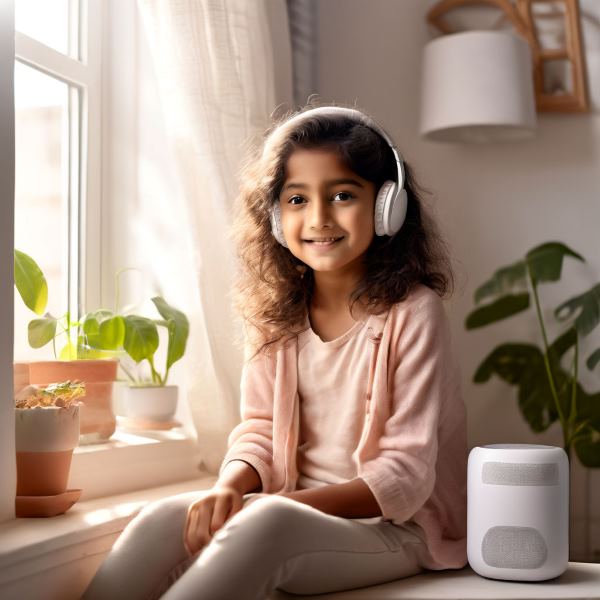Importance Of Listening Skills For Students
In a world that often emphasizes the importance of speaking, it’s easy to overlook the critical role that listening skills play in a child’s development. Listening is not just the passive act of hearing sounds; it’s an active process that involves paying attention, processing information, and comprehending the meaning of what’s being said. Building strong listening skills in children is essential for their cognitive, social, and emotional growth. In this blog, we’ll explore the foundation of listening, the importance of listening skills, the different types of listening skills, and why investing in a child’s ability to listen is a crucial aspect of their overall development.
According to a study by Stricht and James, listening comprehension is more important than reading comprehension from early childhood through at least middle school (read here).
Foundation of Listening Skills
Listening is a multifaceted skill that requires the foundation of three key components: hearing, listening, and attention.
Hearing is the basic ability to perceive and process sounds. It is a passive process, and it happens involuntarily. Even newborns have the ability to hear sounds, which is the first step towards developing listening skills.
Listening, on the other hand, is an active and intentional process. It involves not only hearing but also comprehending and interpreting the sounds or words being spoken. It requires a conscious effort to understand and make sense of what’s being said.
Attention is the third crucial component. To be a good listener, a child must pay attention to the speaker and stay focused on the conversation or information being conveyed. Attention is a limited resource, and teaching students how to manage and allocate their attention effectively is a fundamental skill for developing good listening habits.
Importance of Listening Skills
Building strong listening skills in students is vital for various reasons:
Enhanced Learning: Good listeners tend to be better learners. When children listen effectively, they absorb more information from teachers, peers, and their surroundings. This ability helps them perform well in school and understand complex concepts.
Effective Communication: Listening is an essential part of effective communication. Children who are skilled listeners can express themselves better, engage in meaningful conversations, and develop stronger interpersonal relationships.
Empathy and Understanding: Listening encourages empathy and understanding. Children who listen well are more likely to understand the perspectives and feelings of others, promoting tolerance and respect.
Problem-Solving: Listening is integral to problem-solving. Students who listen carefully can identify issues and contribute to finding solutions, fostering critical thinking and creativity.
Conflict Resolution: Listening is a critical component of resolving conflicts. Children who can listen to differing viewpoints can work towards peaceful and constructive conflict resolution, reducing misunderstandings and disputes.
Types of Listening Skills
Listening skills can be categorized into various types, each serving a unique purpose in a child’s development. These include:
Active Listening: This involves fully concentrating on what is being said, processing the information, and responding appropriately. Active listening helps in retaining and understanding information.
Critical Listening: Critical listening goes beyond simply hearing words. It involves analyzing and evaluating the content, looking for inconsistencies or biases, and forming a well-informed opinion.
Empathetic Listening: Empathetic listening is about showing understanding and empathy towards the speaker’s emotions and feelings. It’s a key skill in building strong relationships and providing emotional support.
Appreciative Listening: This type of listening is all about enjoying and appreciating what is being said, often related to entertainment, music, or art. It encourages a child’s ability to derive pleasure from various forms of communication.
Selective Listening: Selective listening is the skill of focusing on one source of sound while ignoring others. It’s a valuable skill for filtering out distractions and staying attentive.
Informational Listening: This type of listening focuses on gaining knowledge or facts from the speaker. It’s critical for academic and professional growth, as it involves actively seeking out information.
In conclusion, listening skills are the unsung heroes of a student’s cognitive, social, and emotional development. As parents, caregivers, and educators, it is our responsibility to nurture these skills, ensuring that our children not only hear but actively engage with the world around them. By focusing on active listening, empathy, and critical thinking, we can equip them with the tools they need to succeed in school and beyond.
If you’re looking to take the next step in boosting your child’s listening skills, there’s a fantastic resource at your fingertips. Discover a world of captivating and educational podcasts on the Chimes Mobile App. These podcasts are designed to enhance listening skills in students while providing them with valuable knowledge and entertainment. Don’t miss out on this opportunity – download the Chimes Mobile App today and watch your child’s listening skills reach new heights. It’s time to embark on a listening adventure that will shape their future.





